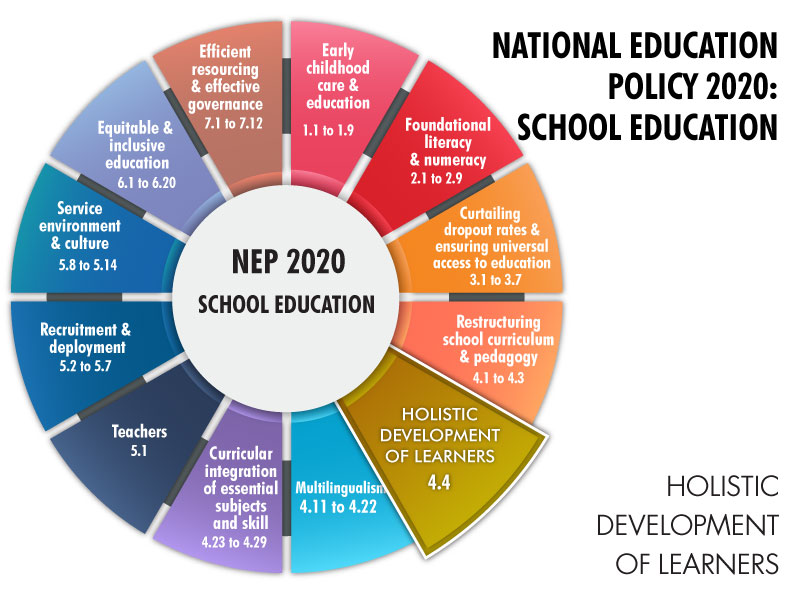The NEP 2020 has reconfigured the curriculum and pedagogy of school education to 5 + 3 + 3 + 4 design with an aim to make them responsive and relevant to the developmental needs and interests of learners at different stages of their development. However, it will not be necessary to make any parallel changes to the physical infrastructure. The policy aims at producing engaged, productive, and contributing citizens for building an equitable, inclusive, and plural society as envisaged by our Constitution.
Holistic development of learners
1. Curriculum content will be reduced in each subject to its core essentials, to make space for critical thinking and more holistic, discovery-based, discussion-based, and analysis-based learning.
2. Holistic development and a wide choice of subjects and courses year to year will be the new distinguishing feature of secondary school education. There will be no hard separation among ‘curricular’, ‘extra-curricular’, or ‘co-curricular’ areas, among ‘arts’, ‘humanities’, and ‘sciences’, or between ‘vocational’ or ‘academic’ streams.
3. Concerted curricular and pedagogical initiatives at relevant stages will be undertaken to develop these various important skills in students at all levels.
4. Concerted efforts, through suitable changes in curriculum and pedagogy, will be made by NCERT, SCERTs, schools and educators, to significantly reduce the weight of school bags and textbooks that students are asked to carry to and from school on a daily basis.
5. The aim of assessment in the culture of our schooling system will shift from one that primarily tests rote memorization skills to one that is more formative, is more competency-based, promotes learning and development for our students, and tests higher-order skills, such as analysis, critical thinking, and conceptual clarity.
6. Board exams will also be made ‘easier’, in the sense that they will test primarily core capacities rather than months of coaching and memorisation; any student who has been regularly attending and making a basic effort in a school class will be able to pass the corresponding subject Board Exam without much additional effort.
7. All students will take State School examinations in Grades 3, 5, and 8 in addition to Board Examinations in Grades 10 and 12. Again, these examinations would test achievement of learning outcomes through assessment of core concepts and knowledge from the national and local curricula, along with relevant higher-order skills and application of knowledge in real-life situations, rather than rote memorization.
8. Topic-centered and project-based Clubs and Circles will be highly encouraged and supported at the levels of schools, school complexes, districts, and beyond. Examples include Science Circles, Math Circles, Music Performance Circles, Chess Circles, Drama Circles, Debate Circles, Sports Circles, and so on. Funds will be made available for the transportation of teachers to take their students to these circles or clubs when they are not meeting at their own schools.
9. Olympiads and competitions in various subjects will be strengthened across the country, with clear coordination and progression from school to local to state to national levels, with the necessary funding to ensure that all students may participate at all levels for which they qualify. Efforts will be made to make available Olympiads in rural areas and in regional languages to ensure widespread participation.
10. Once internet-connected smartphones or tablets are available in all homes and/or schools, online apps with quizzes, competitions, assessments, enrichment materials, and online communities for shared interests will be developed and will work to enhance all the aforementioned initiatives (as group activities for students, with appropriate supervision of parents and teachers).
Read: NEP 2020: SCHOOL EDUCATION | Curriculum and Pedagogy
Also read: NEP 2020: SCHOOL EDUCATION | Change in Academic structure
Also read: NEP 2020: SCHOOL EDUCATION | Multilingualism
